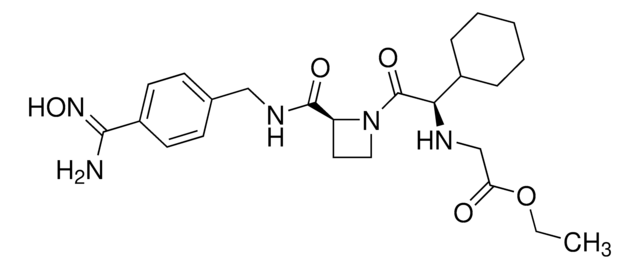Z101
Zimelidine dihydrochloride
solid
Synonyme(s) :
(Z)-3-(4-Bromophenyl)-N,N-dimethyl-3-(3-pyridinyl)-2-propen-1-amine dihydrochloride
About This Item
Produits recommandés
Forme
solid
Niveau de qualité
Couleur
white
Solubilité
0.1 M HCl: 45 mg/mL
H2O: 66 mg/mL
Auteur
AstraZeneca
Chaîne SMILES
Cl[H].Cl[H].[H]\C(CN(C)C)=C(/c1ccc(Br)cc1)c2cccnc2
InChI
1S/C16H17BrN2.2ClH/c1-19(2)11-9-16(14-4-3-10-18-12-14)13-5-7-15(17)8-6-13;;/h3-10,12H,11H2,1-2H3;2*1H/b16-9-;;
Clé InChI
CXGURXWCQYHDIR-ULPVBNQHSA-N
Informations sur le gène
human ... HTR1A(3350) , HTR1B(3351) , HTR1D(3352) , HTR1E(3354) , HTR1F(3355) , HTR2A(3356) , HTR2B(3357) , HTR2C(3358) , HTR3A(3359) , HTR3B(9177) , HTR3C(170572) , HTR3D(200909) , HTR3E(285242) , HTR4(3360) , HTR5A(3361) , HTR5B(645694) , HTR6(3362) , HTR7(3363)
Application
Actions biochimiques/physiologiques
Caractéristiques et avantages
Informations légales
Mention d'avertissement
Warning
Mentions de danger
Conseils de prudence
Classification des risques
Acute Tox. 4 Oral
Code de la classe de stockage
11 - Combustible Solids
Classe de danger pour l'eau (WGK)
WGK 3
Point d'éclair (°F)
Not applicable
Point d'éclair (°C)
Not applicable
Équipement de protection individuelle
dust mask type N95 (US), Eyeshields, Gloves
Certificats d'analyse (COA)
Recherchez un Certificats d'analyse (COA) en saisissant le numéro de lot du produit. Les numéros de lot figurent sur l'étiquette du produit après les mots "Lot" ou "Batch".
Déjà en possession de ce produit ?
Retrouvez la documentation relative aux produits que vous avez récemment achetés dans la Bibliothèque de documents.
Notre équipe de scientifiques dispose d'une expérience dans tous les secteurs de la recherche, notamment en sciences de la vie, science des matériaux, synthèse chimique, chromatographie, analyse et dans de nombreux autres domaines..
Contacter notre Service technique






